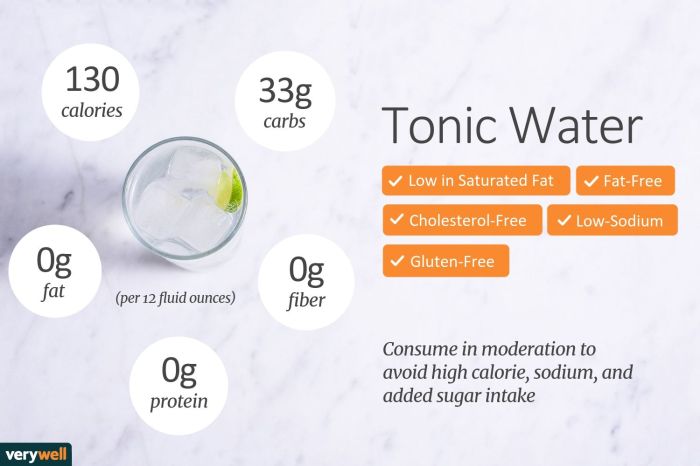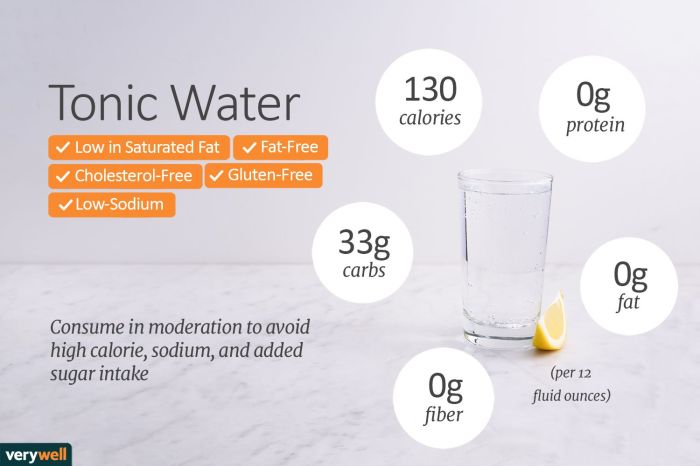Caloric Content and its Implications
Nutrition facts of tonic water – Tonic water, a popular mixer for cocktails and a refreshing beverage on its own, often gets overlooked in terms of its nutritional profile. While generally low in calories compared to sugary sodas, understanding its caloric content and its potential impact on overall health is crucial for informed consumption. This section will explore the typical caloric content of tonic water, its implications for daily caloric intake, and its relationship to weight management and overall well-being.The typical caloric content of tonic water varies slightly depending on the brand and serving size.
However, a standard 12-ounce serving generally contains between 80-100 calories. This seemingly small number can accumulate quickly, especially when consumed regularly as part of mixed drinks or in larger quantities.
Caloric Contribution to Daily Intake
Regular consumption of tonic water can significantly contribute to an individual’s overall daily caloric intake. Consider a person aiming for a 2000-calorie daily diet. Two 12-ounce servings of tonic water would contribute 160-200 calories, representing 8-10% of their total daily allowance. This percentage might seem small, but these calories add up, particularly when combined with other caloric beverages and foods throughout the day.
Over time, consistent consumption of tonic water above and beyond an individual’s caloric needs could lead to weight gain.
Tonic Water’s Role in Weight Management and Overall Health
The caloric content of tonic water, while relatively low compared to many other sweetened beverages, still plays a role in weight management. Excess calorie consumption, regardless of the source, can lead to weight gain if it consistently surpasses the body’s energy expenditure. Therefore, mindful consumption of tonic water, particularly for individuals watching their weight, is important. Beyond weight management, excessive sugar intake, a key component of many tonic water brands, is linked to a range of health problems.
Potential Health Consequences of Excessive Consumption
Excessive consumption of tonic water, primarily due to its high sugar content, can contribute to several health problems. It’s important to remember that while some tonic waters offer sugar-free options, many still contain significant amounts of added sugar.
- Weight Gain: As previously discussed, excess calories from tonic water contribute to weight gain if not balanced with sufficient physical activity and a healthy diet.
- Type 2 Diabetes: High sugar intake is a major risk factor for developing type 2 diabetes. Regular consumption of sugary tonic water can increase the risk of this chronic disease.
- Heart Disease: High sugar diets are linked to an increased risk of heart disease. The added sugars in tonic water can contribute to this risk.
- Dental Problems: Sugary drinks promote tooth decay. The high sugar content in tonic water can damage tooth enamel and increase the risk of cavities.
- Metabolic Syndrome: Metabolic syndrome is a cluster of conditions, including high blood pressure, high blood sugar, excess body fat around the waist, and abnormal cholesterol or triglyceride levels. Excessive sugar consumption is a contributing factor.
Quinine Content and Health Effects

Tonic water’s characteristic bitter taste comes from quinine, an alkaloid derived from the bark of the cinchona tree. While it adds a distinctive flavor, understanding the amount of quinine present and its potential health implications is crucial for informed consumption.The amount of quinine in tonic water varies depending on the brand and recipe. Generally, a typical 200ml serving contains between 8 to 20mg of quinine.
However, this can fluctuate significantly, so always check the product label for specific details. It’s important to note that this is a considerably lower concentration than that found in medications specifically containing quinine.
Quinine’s Effects on the Body, Nutrition facts of tonic water
Quinine has a complex relationship with human health, exhibiting both potential benefits and risks. Its effects are multifaceted and depend on factors such as dosage, individual sensitivity, and pre-existing health conditions.
Quinine’s primary known effect is its antimalarial property. Historically, it was a cornerstone of malaria treatment.
However, due to the emergence of drug-resistant strains of malaria and the potential for serious side effects, quinine is now largely reserved for severe cases or when other antimalarials are ineffective.
In lower concentrations, such as those found in tonic water, quinine’s antimalarial effect is negligible.
Potential Interactions and Risks
It’s crucial to be aware of potential interactions between quinine and other medications or health conditions. High doses of quinine can interact negatively with various drugs, potentially increasing the risk of adverse effects.
Quinine can interact with blood thinners, increasing the risk of bleeding.
Understanding the nutrition facts of tonic water, particularly its sugar and quinine content, is crucial for mindful drinking. For a contrasting perspective on artificially sweetened beverages, checking out the diet dr pepper nutrition facts can be insightful. Comparing these two reveals interesting differences in caloric content and artificial sweetener use, ultimately helping you make informed choices about your beverage intake, especially when considering the nutritional profile of tonic water.
Individuals with heart conditions, particularly those with irregular heartbeats (arrhythmias), should exercise caution when consuming even small amounts of quinine.
People with glucose-6-phosphate dehydrogenase (G6PD) deficiency, a genetic condition affecting red blood cells, are at increased risk of hemolytic anemia from quinine.
Pregnant or breastfeeding women should consult a healthcare professional before consuming products containing quinine.
Moderate Consumption and Health Considerations
While the quinine content in tonic water is generally low, excessive consumption should be avoided. The potential risks associated with higher doses of quinine are well-documented. Moderate consumption, mindful of individual sensitivities and potential interactions with other medications, is key to minimizing any potential adverse effects. Individuals with specific health concerns or those taking other medications should consult their doctor before regularly consuming tonic water.
Sodium and Other Minerals

Tonic water, while often enjoyed for its refreshing taste and subtle bitterness, contains more than just carbonation and quinine. A closer look reveals a profile of minerals, with sodium being a key component to consider in the context of overall dietary intake and individual health needs.Sodium content in tonic water varies slightly depending on the brand and recipe, but generally, a typical 150ml serving contains around 10-20mg of sodium.
This amount is relatively low compared to many processed foods and beverages, but it’s still relevant to consider, particularly for individuals following a low-sodium diet.
Sodium Content and Dietary Implications
The sodium content of tonic water, while modest, is a factor for individuals managing their sodium intake. Those on a low-sodium diet, often prescribed for conditions like hypertension (high blood pressure) or heart failure, need to monitor their sodium consumption carefully. Even small amounts from multiple sources can accumulate and impact blood pressure levels. For example, someone consuming several servings of tonic water daily might exceed their recommended daily sodium intake depending on other dietary choices.
Therefore, individuals with such conditions should be mindful of tonic water consumption and factor it into their overall sodium intake plan.
Other Minerals in Tonic Water and Their Potential Health Impacts
Besides sodium, tonic water contains trace amounts of other minerals, often derived from the water source and added ingredients. These may include potassium, magnesium, and calcium. However, the quantities are typically very small and unlikely to significantly contribute to an individual’s daily mineral requirements. The potential health impacts of these trace minerals from tonic water are therefore minimal, especially when considering the larger context of a balanced diet rich in fruits, vegetables, and other mineral-rich foods.
Electrolyte Balance and Tonic Water Consumption
The impact of tonic water consumption on electrolyte balance is generally negligible for most individuals. The small quantities of sodium and other minerals present are unlikely to significantly disrupt the delicate balance of electrolytes in the body. However, consuming excessive amounts of tonic water, particularly in conjunction with strenuous physical activity leading to significant fluid loss, could potentially contribute to minor electrolyte imbalances, although this scenario is quite rare.
The body’s regulatory mechanisms are usually efficient at maintaining electrolyte homeostasis, unless there is a pre-existing medical condition affecting electrolyte regulation. For the vast majority of people, moderate tonic water consumption poses no significant risk to electrolyte balance.
Top FAQs: Nutrition Facts Of Tonic Water
Is tonic water suitable for people with diabetes?
Due to its sugar content, tonic water should be consumed in moderation by individuals with diabetes. It’s advisable to check the specific sugar content of the brand and adjust consumption accordingly within their daily carbohydrate allowance.
Does tonic water cause any allergic reactions?
While rare, some individuals may experience allergic reactions to quinine, a key ingredient in tonic water. Symptoms can range from mild skin irritation to more serious reactions. Individuals with known quinine allergies should avoid consuming tonic water.
Can tonic water dehydrate me?
While tonic water itself doesn’t directly cause dehydration, its diuretic effect (due to its caffeine content in some brands) might increase urine production. Therefore, it’s important to balance tonic water consumption with adequate water intake, especially in warmer climates or during physical activity.
Is tonic water good for weight loss?
Tonic water is not inherently beneficial for weight loss. Its sugar and calorie content can contribute to weight gain if consumed excessively. Opting for sugar-free alternatives and limiting portion sizes are crucial for weight management.
